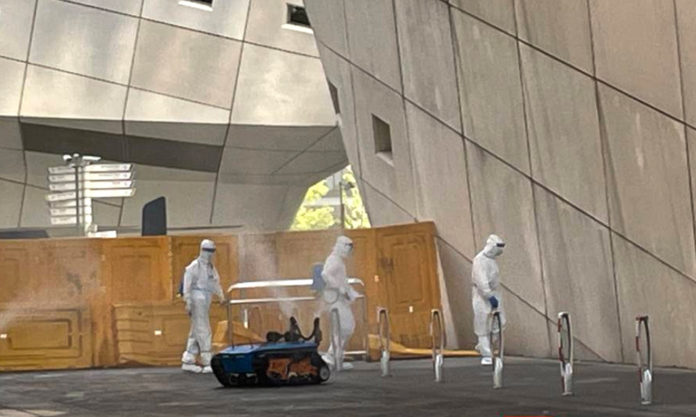With COVID now all but dead in Nanjing, we need be sure it does not once again return. And lend a hand to other areas in China now battling their own outbreak. Time for caterpillar tracks to come the rescue.
This morning’s press conference revealed the news. There were no new cases of COVID discovered in Nanjing. Even near the airport. With 3 cases recorded on Friday and Saturday, Nanjing’s total in the outbreak remains at 231, reported The Paper.
That’s fabulous. But how do we make sure that number is once again zero tomorrow? And the day after.
One of the positive aspects to emerge from COVID last year was that China got a whole lot cleaner. From wet markets to supermarkets, restaurants to take out; almost overnight, we were suddenly living in a fresh, new Middle Kingdom, sanitised on a daily basis.
Indeed, disinfection of surfaces was key to China’s COVID successful strategy. And it’s now again playing a role in keeping the Delta variant at bay. For this time around though, we now have some robotic help.
It’s a 1.3-metre-long, 0.9-metre-wide, 0.45-metre-tall, remotely-operated All Terrain Vehicle (ATV). And it looks like a tank.
Rotating heads atop the robot can fire a spray of disinfectant a distance of 40 metres, and up to 15 metres high up into the air. One litre of disinfectant can sterilise a 1,000 square-metre area and with a 70 litre-tank in its belly, the robot replaces 20 of its human equivalent.
With its pair of caterpillar tracks (or continuous tracks) for propulsion, the ATV can also climb gradients and stairs with ease, mounting small obstacles in its path.
It is understood that there are at present six such ATVs operating in Nanjing, reports the Yangtze Evening News. In addition to the one pictured working at Nanjing International Youth Conference Centre, others can be found in enclosed and controlled isolation areas in Qilin Subdistrict of Jiangning and at 14 nucleic-acid testing points.
Xue Xinyu, Dean and Chief Scientist at the Nanjing Nanji Agricultural Research Institute (南京南机智农研究院), spoke with local media. “Now we are using remote control methods, but soon we plan to transform it into being entirely intelligent”, Xue was reported as saying.
“Through a cloud-control platform, we can input the data and it can work on its own. No one need go directly into the epidemic area.”
Plans are also already under way to scale up production of the ATV, so that it may be rolled out in other cities experiencing the side effects of the Lukou-borne outbreak. Nanjing is giving back.









